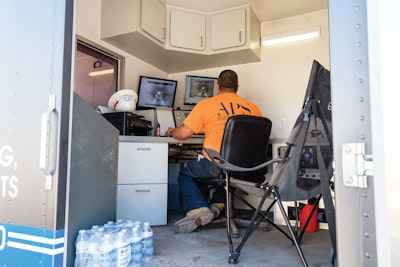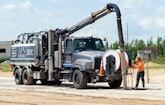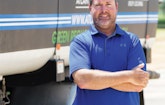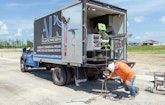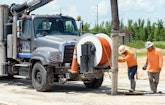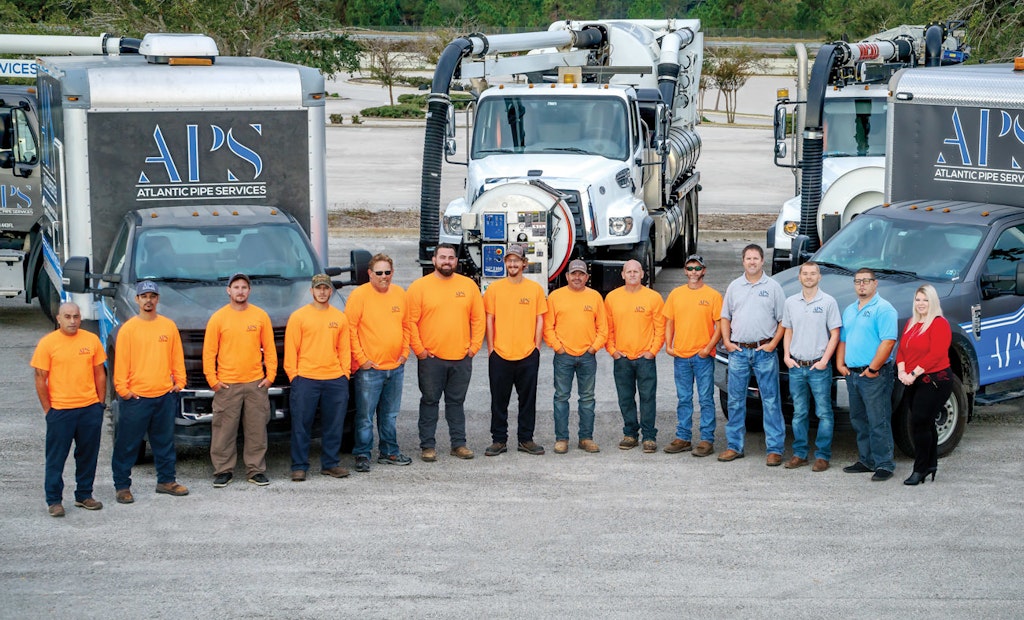Interested in Business?
Get Business articles, news and videos right in your inbox! Sign up now.
Business + Get AlertsIt’s often said that success in selling real estate depends primarily on three things: location, location, location. Similarly, the quick growth of Atlantic Pipe Services stems mainly from three factors: technology, technology, technology.
Of course, other things also fueled the Sanford, Florida-based company’s rapid expansion, which is vividly reflected in the size of its equipment fleet after just one year in business — three vacuum trucks, three television trucks and a pressure-grouting truck. An experienced workforce, a spend-money-to-make-money philosophy and an emphasis on using equipment as marketing vehicles certainly helped prompt the growth spurt.
But in the end, an emphasis on technology — both in the office and out in the field — has proved to be a big market differentiator.
“As a new company that wants to stay ahead of competitors, we need to be on the cutting edge,” says Allan Cagle, president of the firm established in 2017 and owned by venture capitalists Jon Hall Jr. and Keith Carson. “We never want to miss an opportunity to gain a new client, nor do we want to send a prospective client to a competitor. As such, we want to be able to offer clients the best repair for a particular application.”
To accomplish that, Cagle fashioned the company from the get-go as a diversified, full-service business that offers clients an array of trenchless pipe rehab services. About 85 to 90 percent of its business stems from new construction of sewer pipes, working for either municipalities or engineering firms. Its main services include cleaning, televising, laser profiling, and cleaning newly laid pipes in residential and commercial developments before they go live. But the company also does rehab work using chemical-grout injection and installation of CIP sectional pipe liners.
“We inspect storm sewers to find things such as debris, pipe sags and infiltration in laterals,” Cagle explains. “And all plastic pipes need to be laser-profiled to check their ovality before any roads are built.
“Nobody’s perfect — we’re all human,” he continues. “Things happen — joints don’t get filled properly or pipes crack. Each problem has a different level of severity. We might be able to pressure-grout a leaky joint, but a pipe with structural cracks might warrant (sectional) pipe lining. And sometimes the problem is so severe that all the tools in my tool bag aren’t sufficient. Then it’s a dig-out job, which I sub out to companies I trust.
“As an independent contractor, I have to be able to offer all pertinent services related to our line of work,” he adds. “I have to be a one-stop shop. At the end of the day, I don’t want to give work away and lose money.”
Deep roots
Cagle got into the pipe rehab field 22 years ago when he started working for his father-in-law, who owns a similar company in nearby Edgewater. “I started working for him right out of college,” he says, noting he earned a business administration degree at a two-year community college. “I was his first employee.”
But stymied by the lack of growth opportunities at a smaller, family-run company, Cagle left in February 2015. After a brief stint as a director of operations at another company, he got a call from Hall and Carson and agreed to build a new company from scratch.
“We grew very, very quickly,” Cagle says. “I had a lot of contacts in the industry to help establish a client base. I literally started the company with one vac truck operator and me performing all the work. Then we added Ryan Clayton, our administrative manager. After that, things really took off — we just kept getting busier and busier.”
In August 2017, APS bought its first water-recycling combination vacuum truck from Vacall - Gradall Industries, reinforcing its stance as a high-tech company. The company bought a second truck in November.
“Keith and Jon are equity investors,” Cagle says, explaining how the company could afford so much expensive equipment in such a short time. “They don’t micromanage at all. They’re almost like silent partners.”
While word-of-mouth referrals spurred growth, so did the company’s use of equipment as marketing tools. All of APS’ vehicles are outfitted with vinyl wraps made by Media 1/Wrap This. The wraps aren’t inexpensive; a vacuum-truck wrap might run as high as $5,000. But the return on investment makes them a worthwhile expenditure, Cagle says.
“They’re all large vehicles — big moving billboards,” he says. “Why wouldn’t I want to put as much information about our company on them as I can so people can see it as the trucks are driving along the road? If I pick up two or three jobs, the wraps pay for themselves. And we do get calls from people who see them.”
Mighty fleet
Providing a range of services requires an array of equipment. As such, APS owns a Vactor 2100 Plus combination sewer vac truck, built on a 2017 Freightliner 114SD chassis with a 15-cubic-yard debris tank, a 1,500-gallon water tank and a blower manufactured by Howden Roots. It also invested in two Vacall - Gradall Industries AllJetVac combination sewer vac trucks, each equipped with an AllClean water-recycling package. The trucks feature 2018 Freightliner 114SD chassis outfitted with a 12-cubic-yard debris tank, a 1,500-gallon water tank and a Howden Roots blower.
The company also owns three camera trucks. Two were outfitted by Envirosight on Ford F-550 four-wheel-drive trucks with Rovver X robotic cameras; one also carries a Rovver X SAT lateral-launch camera. The other camera truck also is a Ford F-550, but it’s outfitted by RauschUSA with an M-Series KS 135 laser-profiling robotic camera. “It’s the Cadillac of laser profiling, plus it also can do traditional camera work,” Cagle notes. All three trucks also carry push cameras made by both Envirosight and RauschUSA.
To carry grouting equipment, the company owns a 14-foot enclosed trailer made by Lark United. The company uses Graco pumps to inject chemical grout in stormwater and sewer lines, manholes, and lift stations. The company uses De Neef Construction Chemicals chemical grout from GCP Applied Technologies, a De Neef Construction Chemicals pump for urethane grouting, and mainline packers made by Logiball.
For trenchless pipe repairs, the company also relies on a sectional point repair system from Infrastructure Repair Systems, HydraTite mechanical joint seals made by HydraTech Engineered Products, and Quick-Lock rehab sleeves made by Pipeline Renewal Technologies for 8- to 24-inch-diameter joint repairs and circumferential cracks.
Not all the technology is focused on pipe rehab and repairs, however. The company developed its own cloud-based data service that allows technicians to quickly upload pipeline inspection videos and get them to customers within one day. The company’s internal information technology department designed and maintains the service, he says.
“That’s been huge in the new-construction market — another way we’ve stayed ahead of our competition,” Cagle says. “I use it as a marketing and sales tool. Fast and efficient communication with clients is huge. They’re very pleased about not having to wait days and days for us to put an inspection video on a thumb drive and mail it to them.”
Speed is essential because often times, the cost of fixing a problem in a sewer line grows the longer it takes to bring it to the clients’ attention. For instance, there are times when field workers don’t communicate a problem right away to a general contractor, a situation that could be exacerbated if a video takes awhile to mail. “We try to catch those problems on both ends, saying something verbally to the guy in the field and to someone in his office,” Cagle says.
In addition, the in-house cloud system positions APS as a professional outfit that stays on the cutting edge of technology and anticipates clients’ needs. “Bridging that time gap makes us look even better and once again keeps us a step ahead of our competition,” he adds.
Aggressive goals
Cagle says the company continues to set aggressive goals for more growth. In January 2017, he set goals for revenue as well as equipment — two vac trucks and two camera trucks. “And we exceeded that,” he says. By the end of 2018, he’d like to invest in another vacuum truck, a grout truck and a camera truck. “I’ve always been very goal-oriented — setting the bar higher and higher,” he says.
A construction boom in central Florida only solidifies his belief that the goal is doable. He’d also like to broaden the company’s geographic reach with satellite offices and invest in a full-scale pipe lining system instead of focusing just on spot or sectional repairs.
“We’ve been very lucky in terms of finding good employees,” he says, noting another critical ingredient in the company’s growth. “They have good attitudes and bring good vibes to work. We also run a tight ship in terms of maintaining good lines of communication with clients. Right now we’re in a position where we have a good core we can build off of. The work definitely is out there right now — it’s just a question of having good competent employees, good equipment and getting the word out.
“I’m out there knocking on doors trying to keep work in front of us,” he concludes. “If I get one shot (at a client), it’s usually a done deal. The word gets out fast once they see what we bring to the table — things like quality work, great communication with clients, and good equipment and new technology that doesn’t break down all the time. That all opens up a lot of doors.”
Company focuses on treating workers right
Attracting workers in a tight labor market is difficult for contractors these days. And often enough, retaining them is just as difficult, as other companies try to poach good employees.
Atlantic Pipe Services does its level best to keep employees from heading for the proverbial greener grass by offering them good benefits, treating them like family, paying cash bonuses and promoting from within, says Allan Cagle, president of the company, based in Sanford, Florida.
“I’ve been down this road myself where companies try to work someone into a supervisory position, but then decide they can’t afford to take a good worker off a TV or vac truck,” he explains. “Then they bring in someone from the outside to be a supervisor. Then morale gets shot because employees feel that all they hear are a lot of empty promises.
“I try my best to figure out ways to bring guys up,” he continues. “Not everyone has the capabilities to be a supervisor, but our goal is to try to promote from within.”
Cagle also believes that the company’s emphasis on investing in new and technologically advanced equipment also is a good selling point for attracting and retaining good employees. Working with older machines that regularly break down is a morale-killer. Moreover, Cagle thinks that employees are more apt to take better care of new equipment.
“We encourage our employees to treat equipment as if it’s their own,” he notes. “We emphasize that they have to take care of equipment because the equipment takes care of us.”
When APS completes a lucrative job, Cagle says the company pays bonuses “here and there.” They also periodically hold events such as Friday afternoon steak cookouts to show that the company appreciates the work they do.
“I’m a firm believer that employees are what make or break a company,” he says. “So I let them know as much as I can how much we appreciate what they do.”
